Perspective: A brave soldier and one horrible day: two lasting memories of Iraq
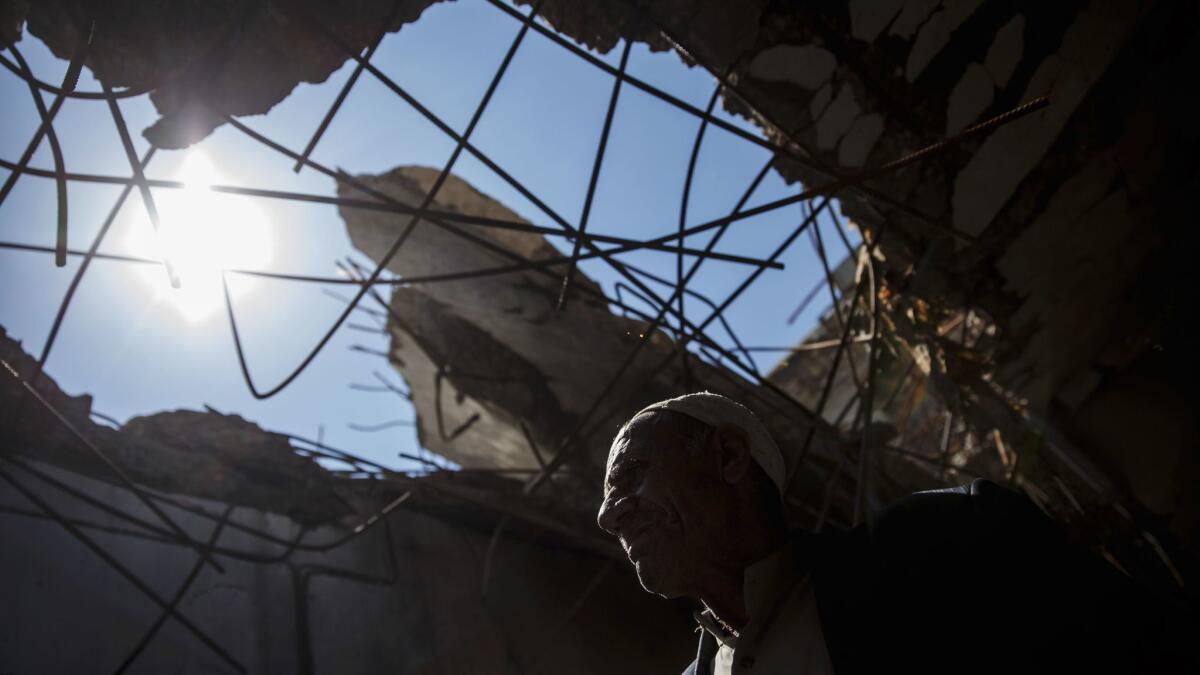
Reporting from MOSUL, Iraq — As I fumbled with the straps of my body armor, an Iraqi gentleman looked at me kindly and said, “You look nervous. Is this your first time here?”
I nodded: I was indeed apprehensive. Though Los Angeles Times colleagues who had covered wars had offered me practical advice — “Always be paranoid, but stay calm” — Iraq was my first assignment in a war zone. The man who asked about my nervousness was Dara Tahsin, who would become a “fixer” for me and my colleague, staff writer Molly Hennessy-Fiske.
As a fixer, Tahsin would do a bit of everything — drive, interpret, solve problems, explain things. He assured me that everything would be OK and that all I had to do was focus on my job. The assignment began in March in Irbil and as I reflect on the experience now, certain events and images come back again and again: the first time an explosives-laden suicide vehicle — in this case, a bulldozer — went off nearby. The blast shook our car and rattled my nerves. There were the displaced Iraqis fleeing Mosul, walking urgently through rain and mud, carrying their children and whatever belongings they could manage.
Other memories pivot from horror — the stench of death rising from collapsed buildings — to the ridiculous. One Iraqi general bore a slight resemblance to Robert De Niro, and as he lectured us, I could not stop staring at him and thinking about De Niro’s frowning face in “Meet the Parents.”
But along with innumerable sights and sounds — collapsed buildings and bridges, the shriek of mortar shells — one person and one day stand out. The person was a brave young soldier named Wissam Daoud. The day I’ll remember for a seemingly endless body count.
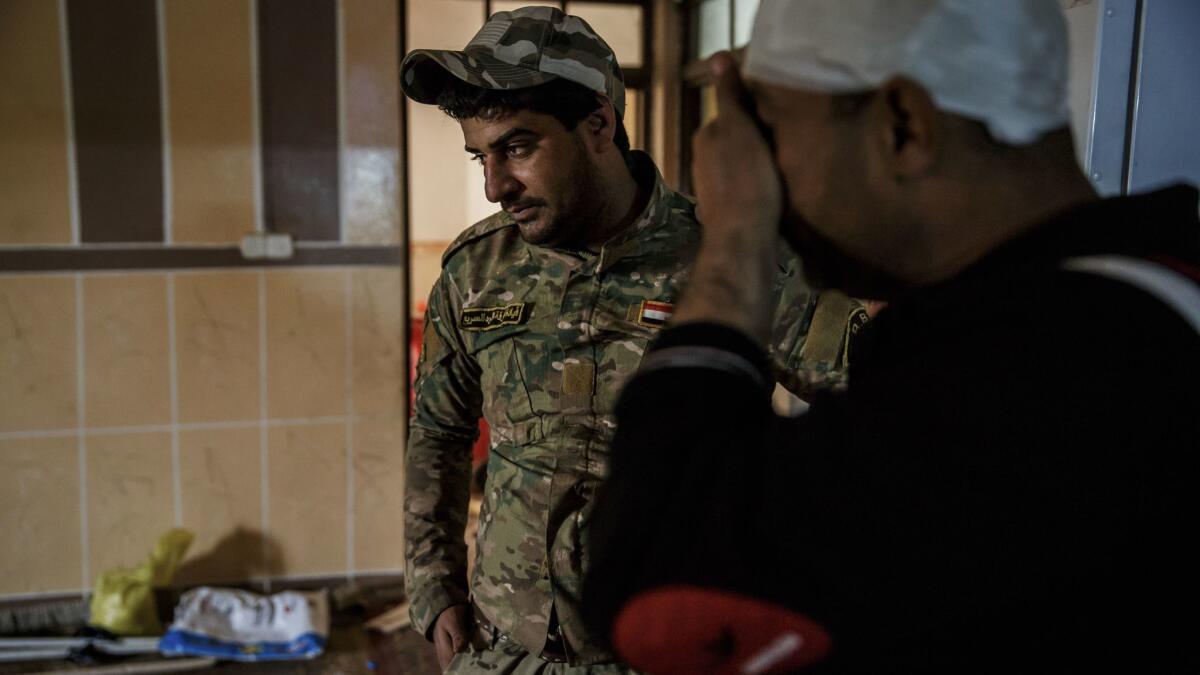
I don’t speak any Arabic, and Wissam Daoud speaks no English, but as millennials we found a way to communicate using our phones. After he showed me a few selfies and video clips from the front lines, it became clear to me that he was a bomb defuser. There were video clips of him and his teammates smiling, making jokes and kissing sticks of dynamite as they went about locating, disarming or detonating explosives planted by Islamic State militants.
Using pictures and gestures, he explained to me how these brave soldiers, armed with just wire cutters, pliers and a pistol, preceded troops at the front lines, going from building to building, sweeping the area clean of booby traps before any advance.
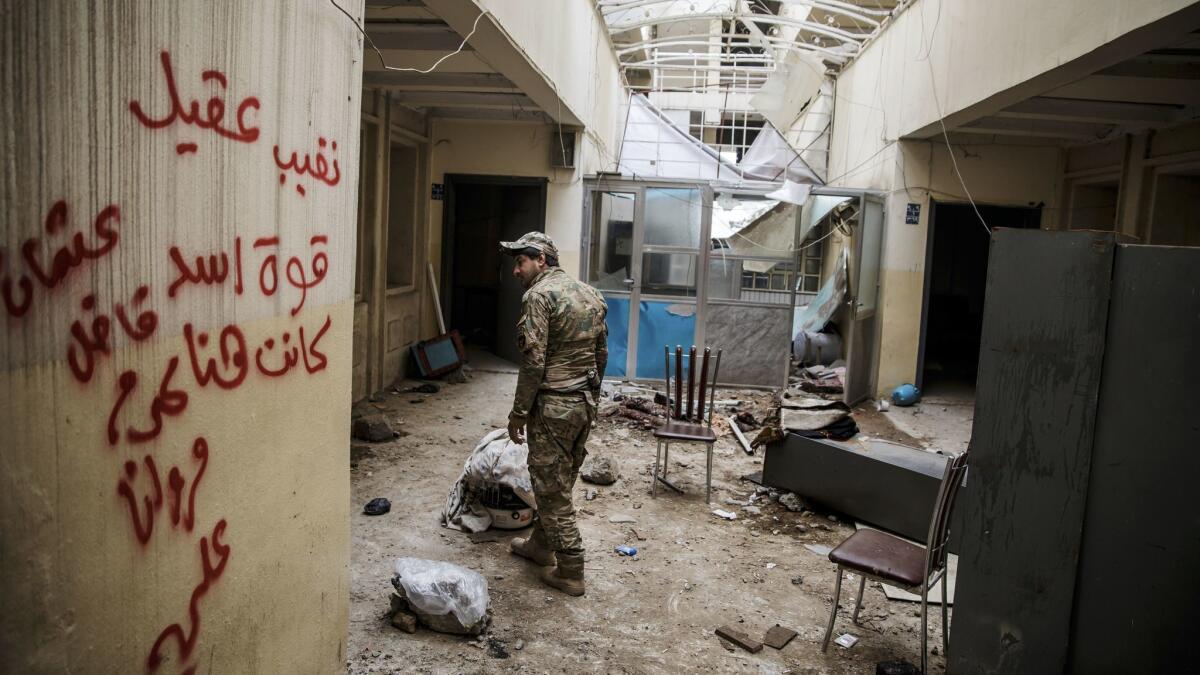
The next day we took a selfie together.
I knew that a trip to the front lines to see what Daoud does was inevitable. One day, I did. After hitching rides from Humvee to Humvee, we eventually reached a large commercial building occupied by Iraqi troops. We made our way to the back of the building, into an alleyway where we could hear bullets zipping by. Soldiers told us that an Islamic State fighter was bearing down on us in the next building, but he was hard to target because he had hard cover.
We had to cross the alleyway eventually. Daoud wanted to show me where his friends Emir Abdel Mehdi and Ali Motar was shot the day before. This was haram territory — forbidden — less than 24 hours ago. Finally, an armored tank unit arrives and kills the militant fighter.
Daoud took my hand and we made a mad dash across the alleyway. Other people did the same, in the opposite direction. The sound of gunfire continued as bullets zipped by.
Daoud took a moment and adjusted his hat as we approached a building that had been sliced into half, revealing a half-dome ceiling and a hole at the bottom. Abdel Mehdi and Motar had tried to crawl through that hole. It’s where they were shot. Daoud, who smokes incessantly, lighted a new cigarette.
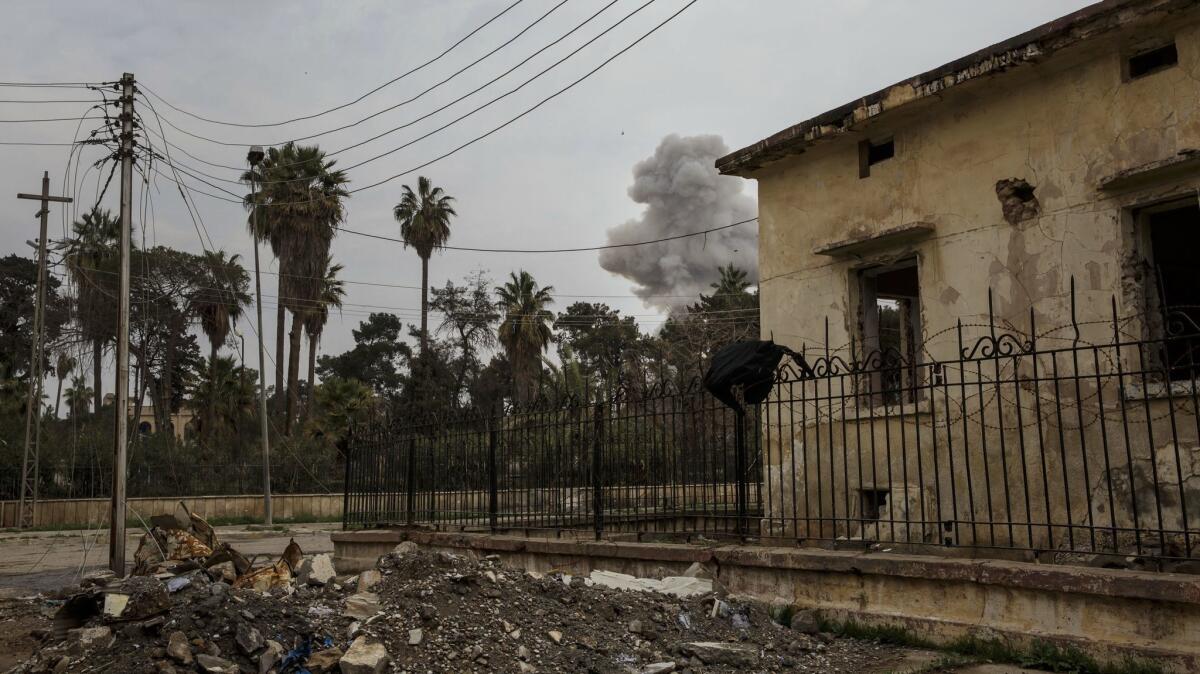
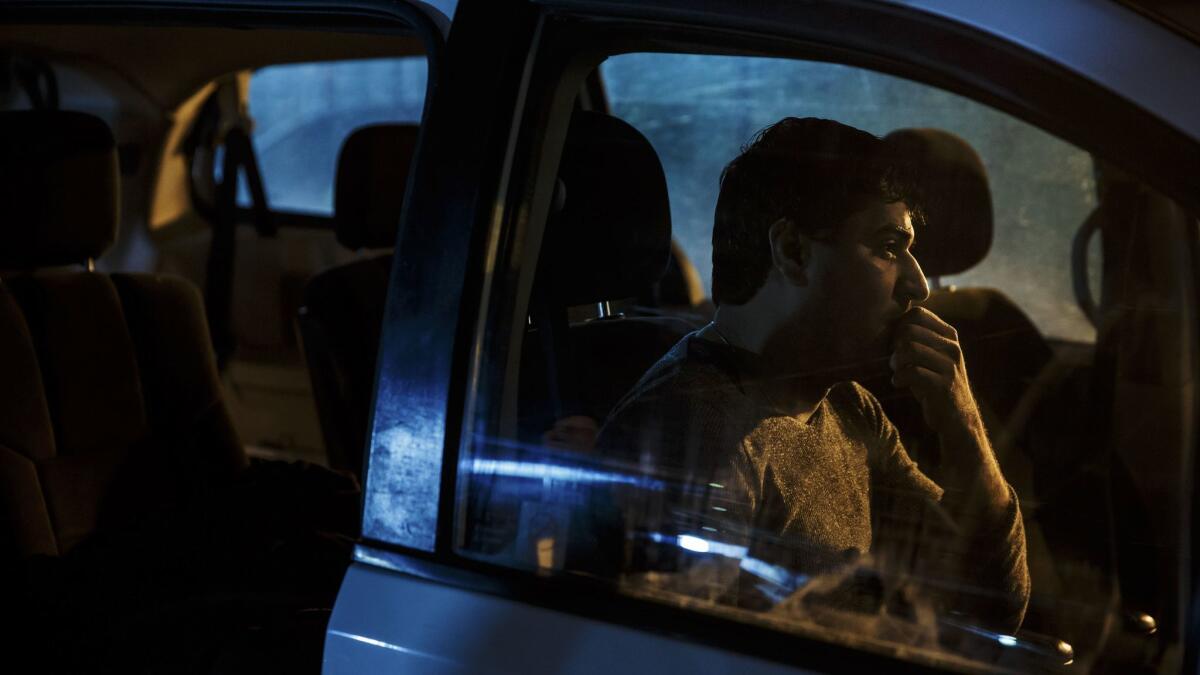
When we return to the alleyway, the tank division soldiers were still eating. They all insisted on hand-feeding me a bite of their lunch, mostly chicken. I had small portions of everyone’s offerings and went on my way.
Later, in the same building occupied by the troops, Daoud and I climbed a flight of stairs and he led me into a room that his team had yet to completely defuse. The only thing that had been defused was the door trigger, which we walked past. Daoud gestured to me to follow his exact footsteps. As we walked in, he pointed out the booby trap on the floor hidden underneath what looked like ceiling tiles that had fallen.
Then he pointed out a wire leading from an air conditioner to another wire that had been attached to the door — that too was a booby trap. The second wire led to the next room, which was packed with what looked like dozens of barrels of explosives waiting for their Hollywood moment.
Unfazed, Daoud lighted another cigarette as he stood in the middle of the room. I backtracked toward a doorway to try to get a wider picture, but the room was cramped and I didn’t bring my wide-angle lens. I kicked myself so hard in that moment.
We built an incredible sense of trust between us. I would follow him as he prepared to detonate an explosive, and just before lighting the fuse, he would turn back to me with his sad eyes and signal for me to get ready to run. As soon as it was lighted, off we went.
Daoud has such an incredible humanity, which he hid behind his sunken eyes and shaggy hair. But in time, all the sadness and pain of the war came to the surface. He had received a phone call telling him another of his teammates had been killed. Soon, we were at the cemetery, before the friend’s flower-adorned grave. Daoud covered his face with his hand and wept.
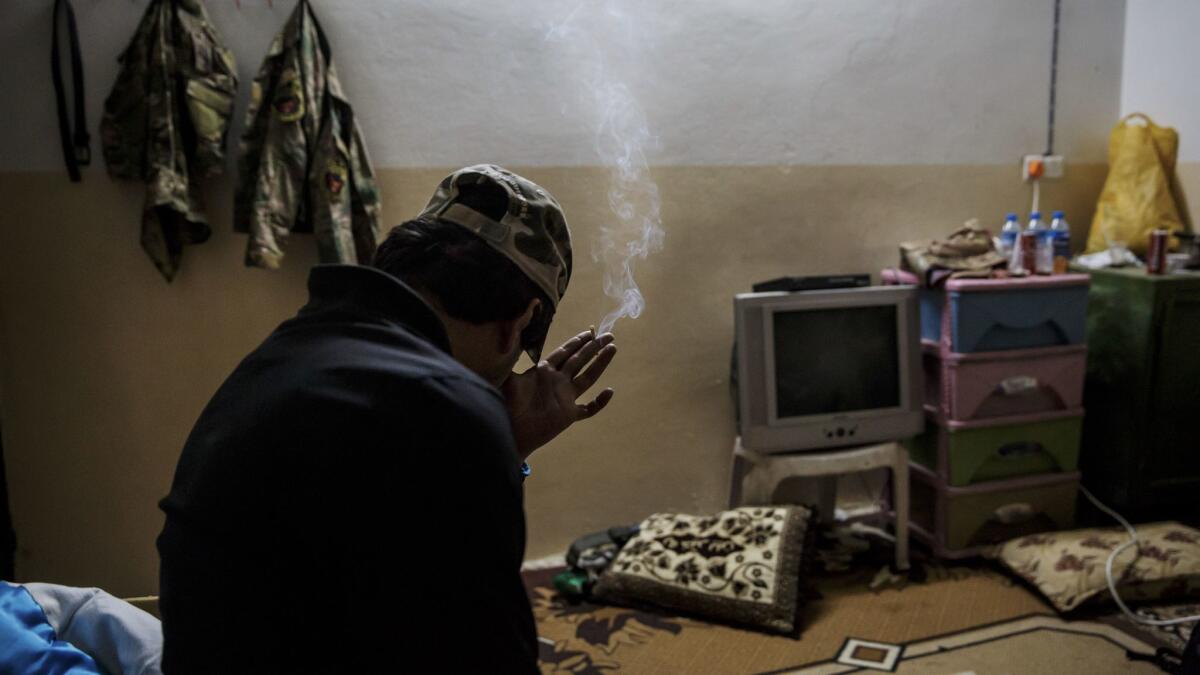
One day in Mosul’s Jadidah neighborhood, I heard yelling and screaming and made my way to another block of flattened buildings. There I saw Mahmoud Salem Ismail wailing while he held on to the blue plastic body bag enclosing his sister, Bushra.
Around him were other bags, and I began counting them. I stopped at 13.
There were three more empty bags. My hands were shaking. I started to count my breaths, grip my camera a little tighter, a practice I use to find focus in frantic moments.
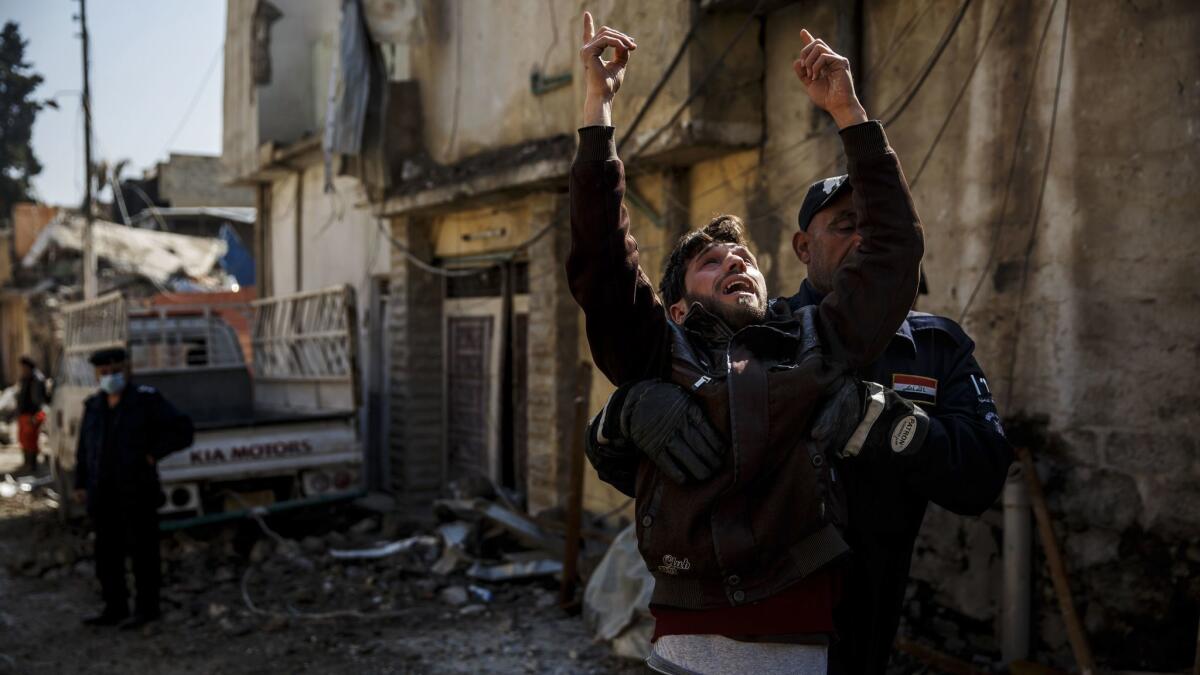
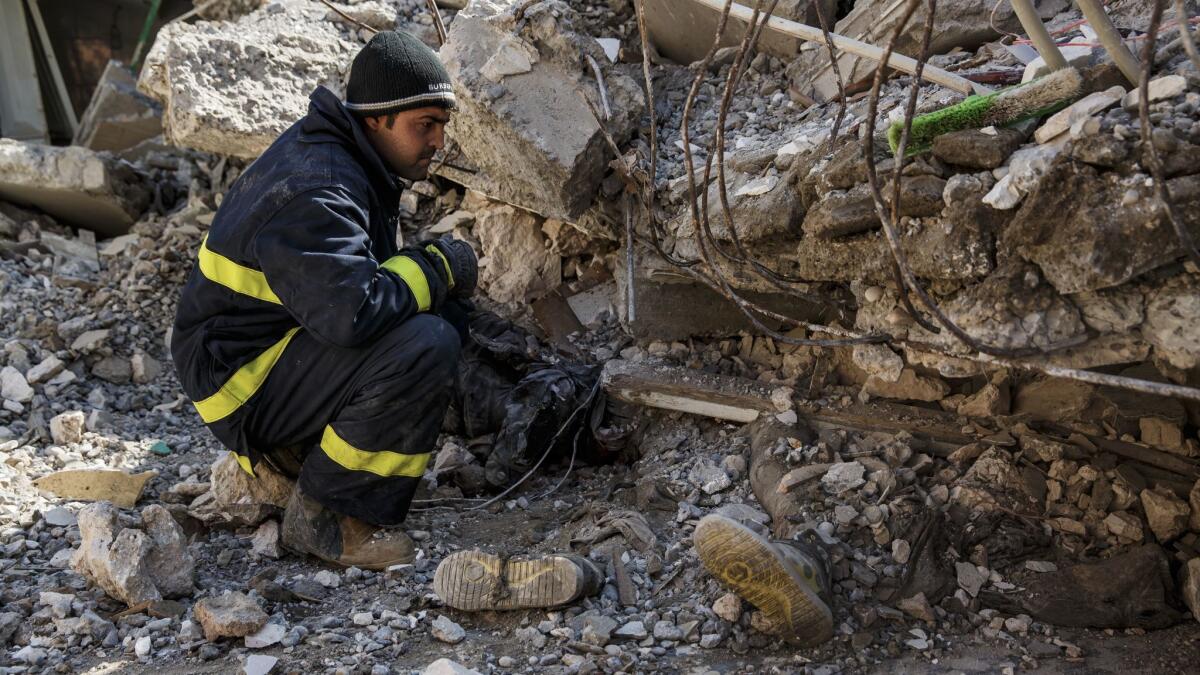
Everything unfolded quickly, and in a matter of seconds Ismail was ushered away by civil defense workers and I followed suit. He grasped his hair and threw his arms wide open as a civil defense worker held on to him. Once I made my way to face him, he thrust his arms upward, as through blaming the heavens.
He was then led to a corner when other neighbors consoled him and gave him water. I wanted to talk to him, but he was clearly in shock and it didn’t feel appropriate in that moment. I let him be.
After the civil defense workers cleared the site of family members who were too distraught to help with digging through the rubble, the work of recovering more bodies began. Immediately, I counted five more: 14, 15, 16, 17, 18.
I remember seeing parts of an infant and a child with a flattened head.
But then there was the body of another child lying on his side, as though in a peaceful slumber. A man, perhaps a relative of the boy, gazed at the body and closed his eyes for a second. He took a deep breath, lowered his head and then zipped up the body bag.
As I photographed crews recovering bodies from yet another destroyed building, a movement in the window of a building facing the flattened home caught my eye. There was someone watching this whole thing from a window. I made my way upstairs in this home and found Turkya Azudin watching workers dig out her dead relatives. She escaped death because she wasn’t home the night the strike happened. She lost 18 relatives.
I stood silently behind her and, with her permission, watched her grieve. She didn’t move for what felt like an eternity. And finally, she turned and rested her face in her hand to cry. My hands were shaking.
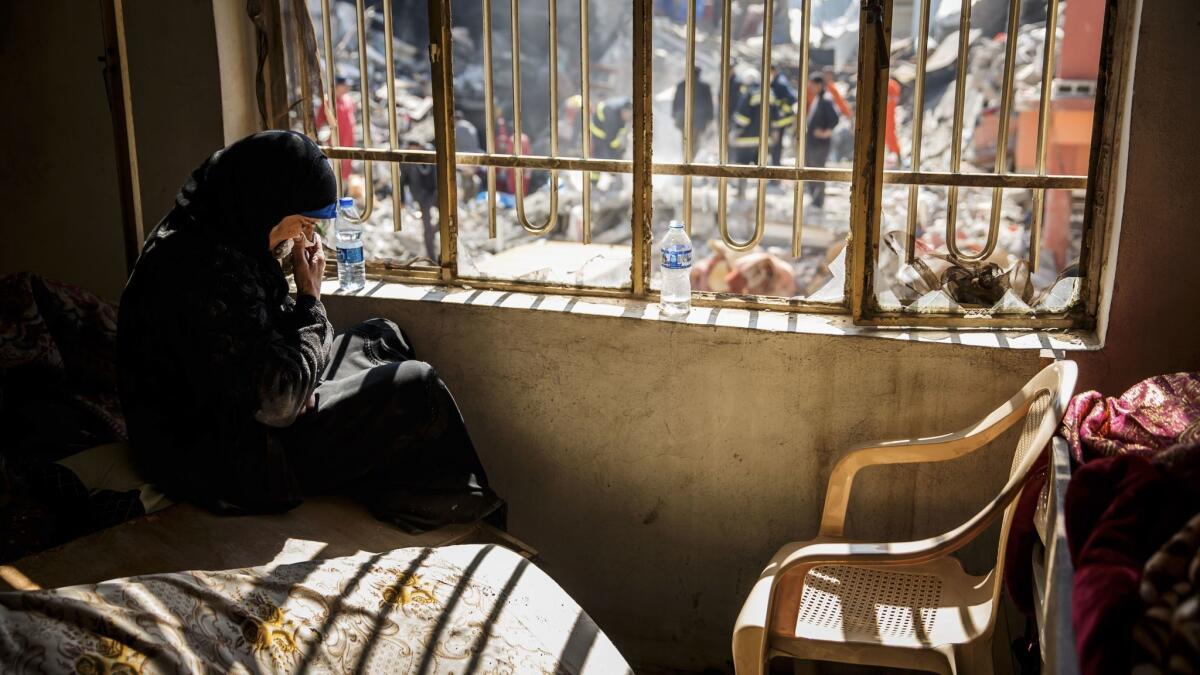
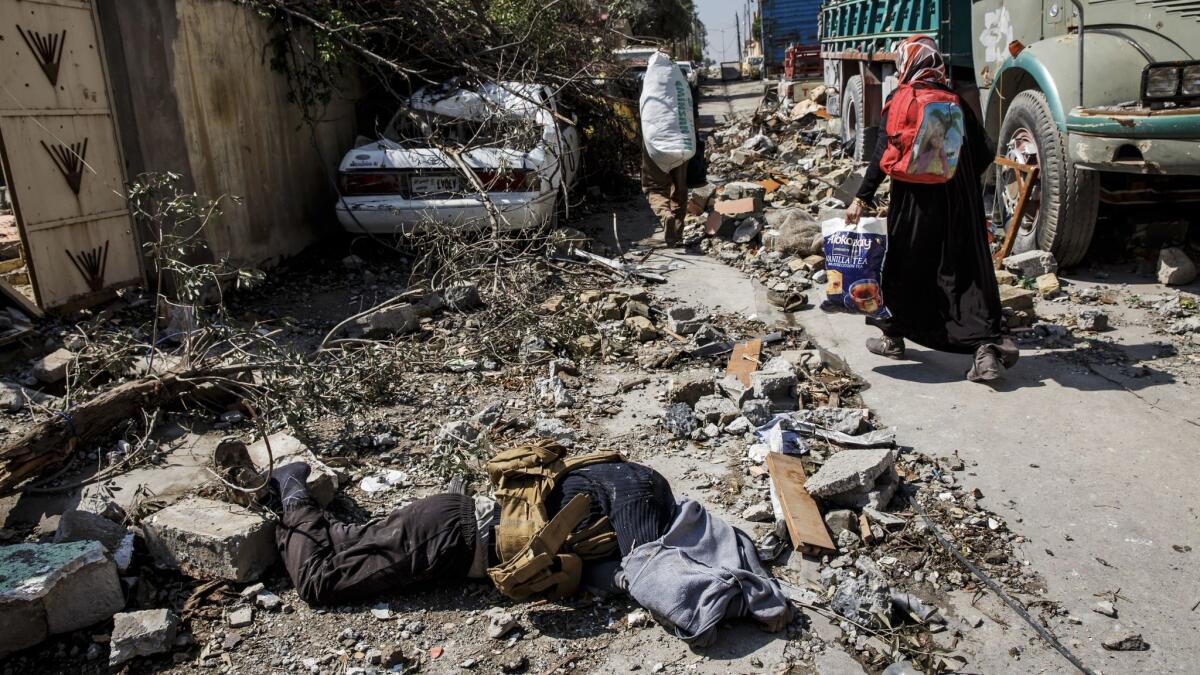
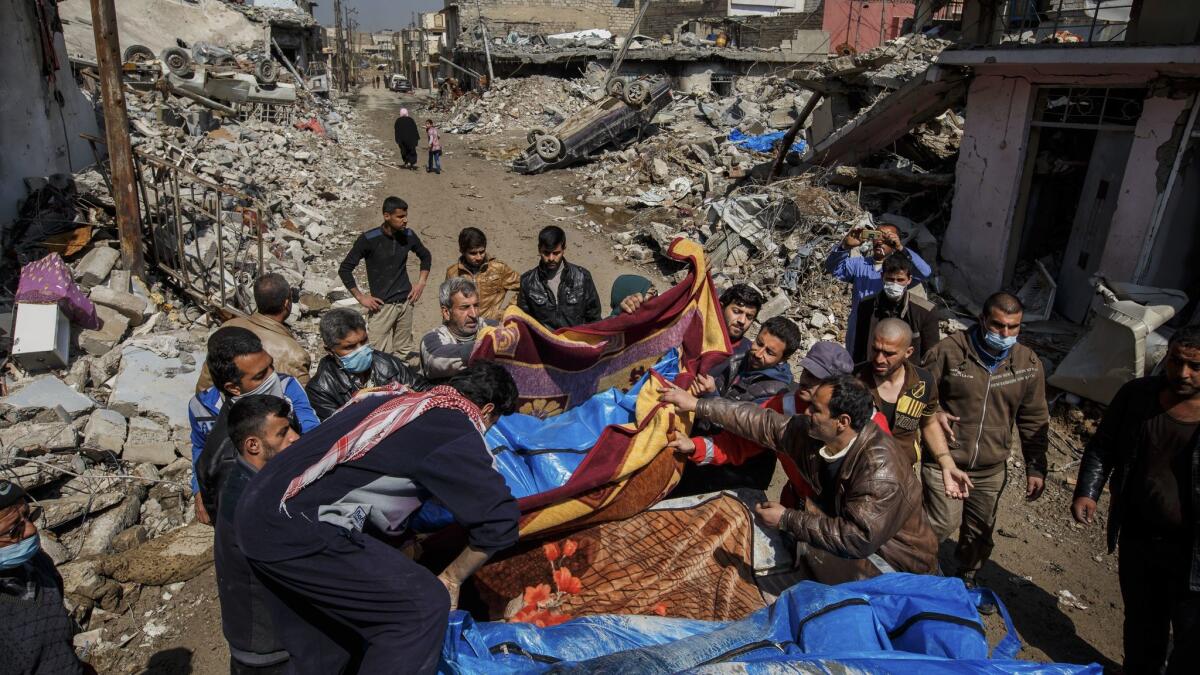
Later, back on the street, a group of five boys who spoke some English approached me. I asked them how damaged the neighborhood was from the airstrike. They took me on a tour of the neighborhood. On the first left turn, we came upon another garage with dozens more blue body bags. I had been continuing the count I started when I photographed Ismail: I was at 30.
We made our way past streets covered in concrete, bricks and rebar. The sound of gunfire and explosions rang nearby. We came across a dead Islamic State fighter sprawled on the ground, his body surrounded by bullets and bullet casings. Somehow, there were bullets just sitting on top of his body. His sweater had been pulled up to cover his face. A woman carrying a Barbie school bag walked by, cursed at the body and walked off. I was at 31.
At another flattened house, a small group of older men greeted me as the boys led me through the rubble. I counted three more bodies. Now it was 34.
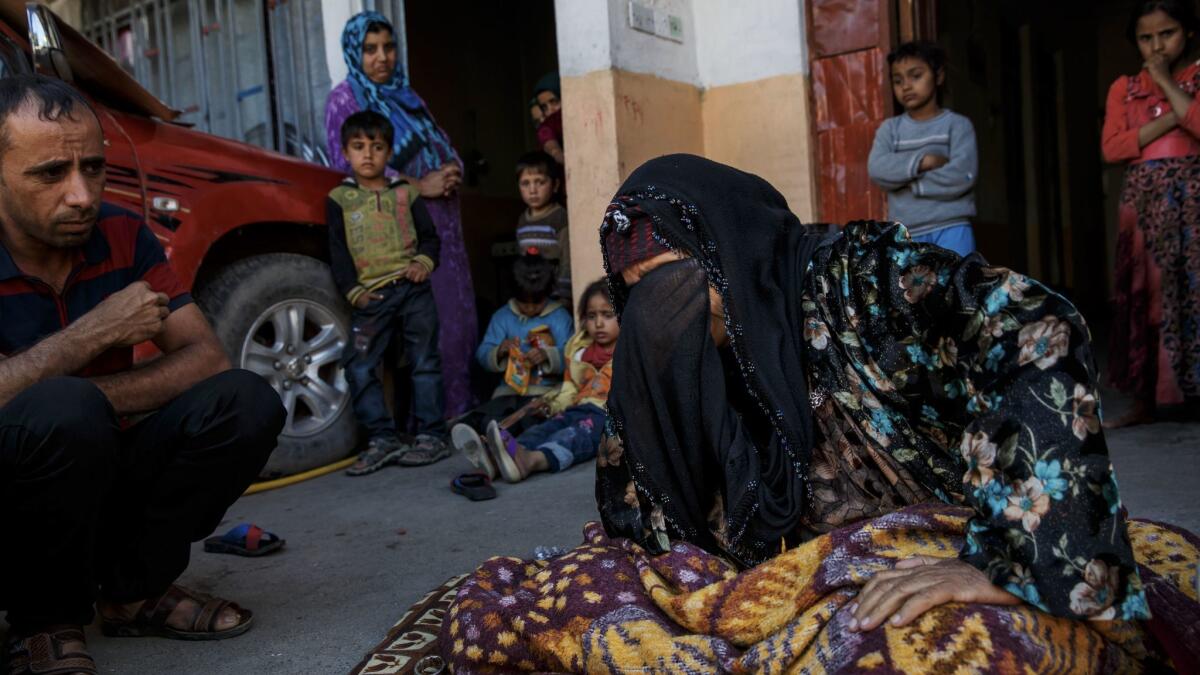
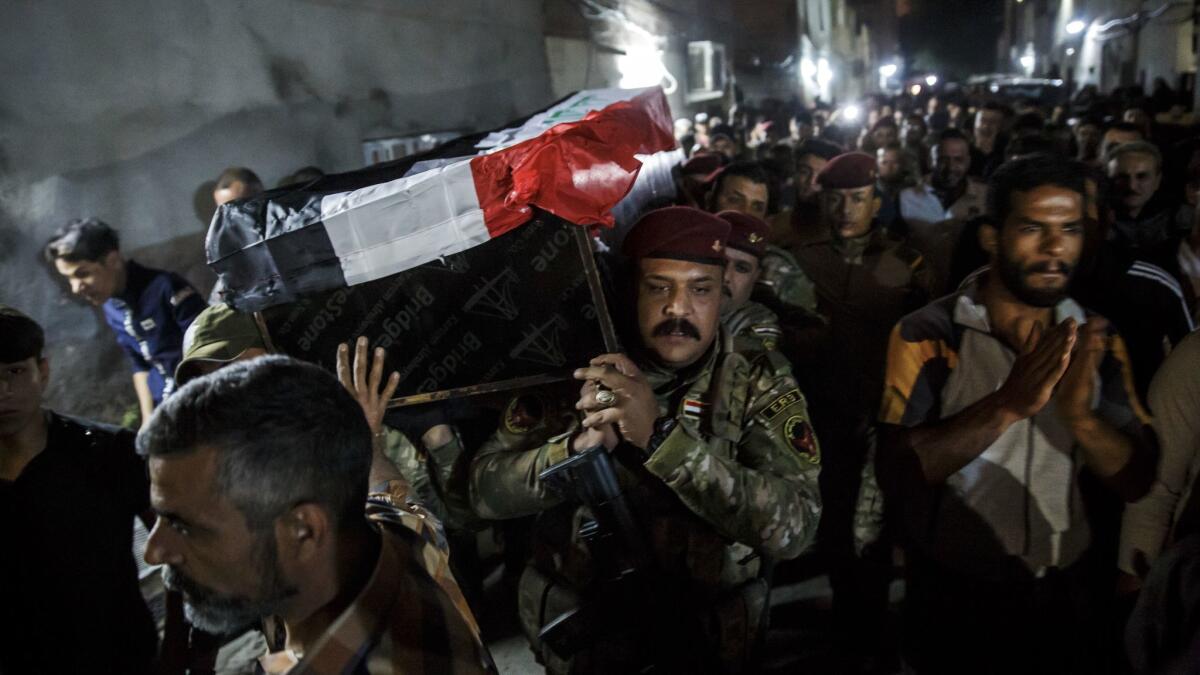
I asked the boys whether there were more casualties at this house and they led me to a basement. I went down and expected to see bodies but there were none. Confused, I talked to the boys again, rephrasing my question. The boys then said that relatives had hidden in the basement but had escaped. Some were injured, but it appeared they would survive. We all chanted, “Inshallah!” (God willing).
Later, I spotted three more body bags on an adjacent street sitting plainly in the rubble. In another remnant of a building, I saw more bodies and started to add to my total until I realized that these corpses were the same dozen bodies I had passed before.
Even with four men doing the work, bodies are incredible heavy to carry. I watched the grief-stricken struggle to carry bodies with dignity and eventually toss them on the back of a pickup truck.
A woman and a girl walked past this macabre scene, and the woman yanked her so she would look straight ahead and not at the truck. I climbed on top of the truck and straightened my horizons in my viewfinder, waiting for the child to turn around. The somber-looking men gathered around for the last body to be piled onto the pickup truck. The body landed with a thud — it was No. 37 — and the girl turned around to witness a horror that no child should ever see.
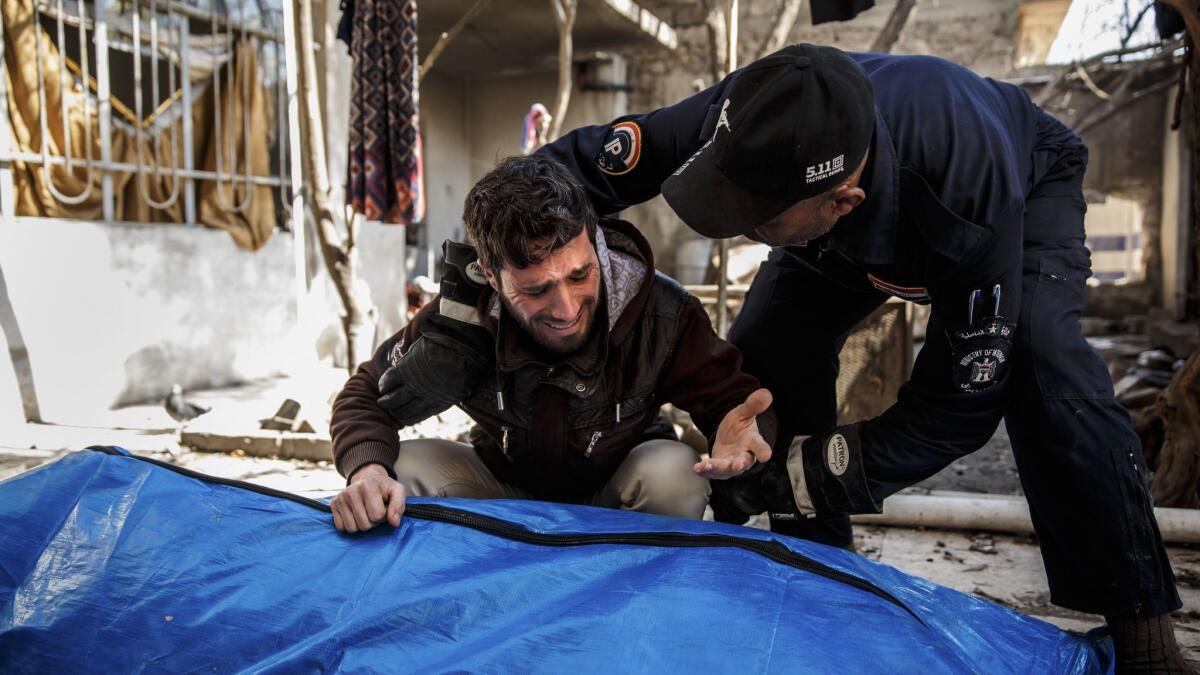
More to Read
Sign up for Essential California
The most important California stories and recommendations in your inbox every morning.
You may occasionally receive promotional content from the Los Angeles Times.











